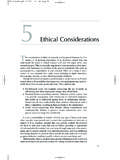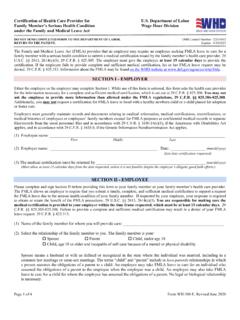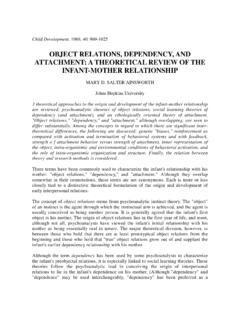Transcription of University of Notre Dame Encyclopedia of Human Behavior
1 1. Sigmund Freud divided mental life into three agencies or Id, Ego, and Superego provinces, id, ego, superego. The id is the oldest and most primitive psychic agency, representing the biological foundations of personality. It is the Daniel K. Lapsley and Paul C. Stey reservoir of basic instinctual drives, particularly sexual (libidinal) drives, which University of Notre Dame motivate the organism to seek pleasure. The ego is a modification of the id that emerges as a result of the direct influence of the external world. It is the To appear in Ramachandran (Ed.), Encyclopedia of Human Behavior . Elsevier. executive of the personality in the sense that it regulates libidinal drive Publication date: 2011 energies so that satisfaction accords with the demands of reality.
2 It is the center of reason, reality-testing, and commonsense, and has at its command a Glossary range of defensive stratagems that can deflect, repress, or transform the Eros One of the two classes of instincts that motivate Behavior . It is described expression of unrealistic or forbidden drive energies. The superego is a further as life instinct, the preserver of all things, incorporating the elements of differentiation within the ego which represents its ideal. The superego sexuality and self-preservation. This is in contrast to the opposing tendency to emerges as a consequence of the Oedipal drama, whereby the child takes on reduce life to an inanimate state, or the death instinct, which is revealed by the authority and magnificence of parental figures through introjection or aggression and sadism.
3 Identification. Whereas the id operates in pursuit of pleasure, and whereas the Erotogenic zones The zones of the body (oral, anal, phallic) that are ego is governed by the reality principle, the superego bids the psychic sequentially invested withsexualized energy (libido), and are hence the source apparatus to pursue idealistic goals and perfection. It is the source of moral of autoerotic pleasure. The sexual instinct is thus a composite instinct, only to censorship and of conscience. become organized in the service of reproductive, genital sexuality upon maturity. (I.) Freud in Context Libido The name reserved for the sexual instincts. Oedipus complex The libidinal cathexis of phallic erotogenic zone leads to a Psychoanalysis is one of those rare intellectual achievements that had desire for union and contact with the opposite-sex parent, and a concomitant the effect of radically transforming Human self-understanding.
4 Indeed, desire to displace the same-sex rival parent. The competition for the opposite- Freudian notions have so thoroughly permeated Human culture that the jargon sex parent engenders anxiety, insofar as the retaliation of the rival is feared (if not the substance) of psychoanalysis is accessible to even the most ( castration complex ). This is resolved by repressing incestuous desires, and untutored observers of Human Behavior , so much so that the poet W. H. identifying with the same-sex parent, which is the foundation of superego Auden could write that for us Freud is not so much a person but rather a formation. Freud once suggested that the course of Oedipal development whole climate of opinion under whom we conduct our different lives.
5 By Freud's own between boys and girls was exactly analogous, but later formulations estimation psychoanalysis effectively completed the intellectual revolution postponed the resolution of the Oedipal conflict for girls until marriage and begun by Copernicus, and advanced by Darwin, a revolution that undermined childbirth. Human conceit regarding its putatively special and privileged position in the Pleasure principle The motivating principle of Behavior is the pursuit of cosmos and in nature. Whereas Copernicus displaced mankind's planet from tension reduction, which is experienced as pleasure. the center of the heavens, and whereas Darwin showed that no comfort can be Primary process The workings of unconscious (id) processes.
6 Instinctual taken in the idea that we are nonetheless above the forces of nature, Freud energy is freely mobile, and capable of displacement and condensation. In completed the assault on Human pretence by showing that even Human reason contrast, secondary process, attributed to ego functioning, attempts to is not what it has been supposed, that Human psychology is, in fact, besieged postpone, revise, or otherwise deflect instinctual motivations. and driven by irrational, unconscious motivations. Indeed, Freud's discovery Transference In the therapeutic situation, the (unconscious) incorporation of of a hidden psychic reality that is beyond the pale of sensible consciousness the analyst in the internal conflicts of the patient.
7 Was thought (by Freud) to be an application of the same Newtonian dualism that accepted the distinction between Human sensory abilities (percepts) and a 2. hidden physical reality that could only be apprehended by mathematics and the armamentum of physical science. The Newtonian scheme was invoked by (II.) The Cornerstone of Psychoanalysis psychoanalysis to advance an understanding of psychic life, an application that hinges on the distinction between conscious and unconscious mental life. Just Freud was drawn initially to the dynamics of depth psychology by the as physics develops scientific techniques to apprehend a physical universe that inability of the neurological community to come to grips with the problem of is beyond immediate Human sensibility, so too does psychoanalysis attempt to hysteria.
8 Hysterics appeared to suffer a host of somatic and physical maladies pierce hidden unconscious realities with its special clinical techniques. ( , motor paralysis, glove anesthesia) that had no apparent neurological Psychoanalysis, then, according to Freud, is to be counted among the natural basis. One promising treatment was the use of hypnosis. Josef Breuer, a sciences; it is a specialized branch of medicine (with the caveat that medical medical colleague of Freud, claimed to have relieved the hysterical symptoms training gives no necessary expertise in psychical affairs), with mental life the of a female patient ( Anna O. ) by such means. In Studies on Hysteria (1895). object of inquiry. Breuer and Freud presented a series of case studies and theoretical articles on the etiology of hysteria and the role of hypnosis in treating it.
9 The authors Although psychoanalysis shocked Victorian sensibilities, particularly claimed that hysterical symptoms have a symbolic meaning of which the with its claims regarding unconscious mental dynamics and infantile sexuality, patient had no conscious knowledge. Symptoms are substitutes for mental acts it was grounded nonetheless in themes common to 19th century science. The that are diverted from normal discharge because the affect associated with the Freudian theory of instincts seemed at home in a culture that was getting used mental processes becomes strangulated (as a result of trauma) and channeled to the ideas of Darwinian biology. Freud's use of spatial models to locate into physical symptoms ( conversion ). That is, a strong affect is prevented psychic structures was in keeping with efforts in neurology to localize brain from being consciously worked out in consciousness, and is diverted instead functions.
10 And the mechanistic Freudian image of the psychological into the wrong path, taking the form of somatic symptoms. Under hypnosis architecture as an apparatus for channeling instinctual drive energies was not this strangulated affect can be set free or purged ( abreacted ), allowed normal out of step with the energy mechanics of 19th century physics. Yet, for all the discharge into consciousness, thereby leading to a removal of symptoms. This trappings of scientific positivism that Freud was wont to claim for treatment was called the cathartic method. Moreover, patients, under hypnosis psychoanalysis, the Freudian project was met with considerable resistance, and tended to recall psychic traumas from a remote past, extending to early the history of the psychoanalytic movement is a history of a struggle for childhood, so that Breuer and Freud could claim that hysterics suffer from academic, clinical, and popular respectability, a respectability that is still not reminiscences.






